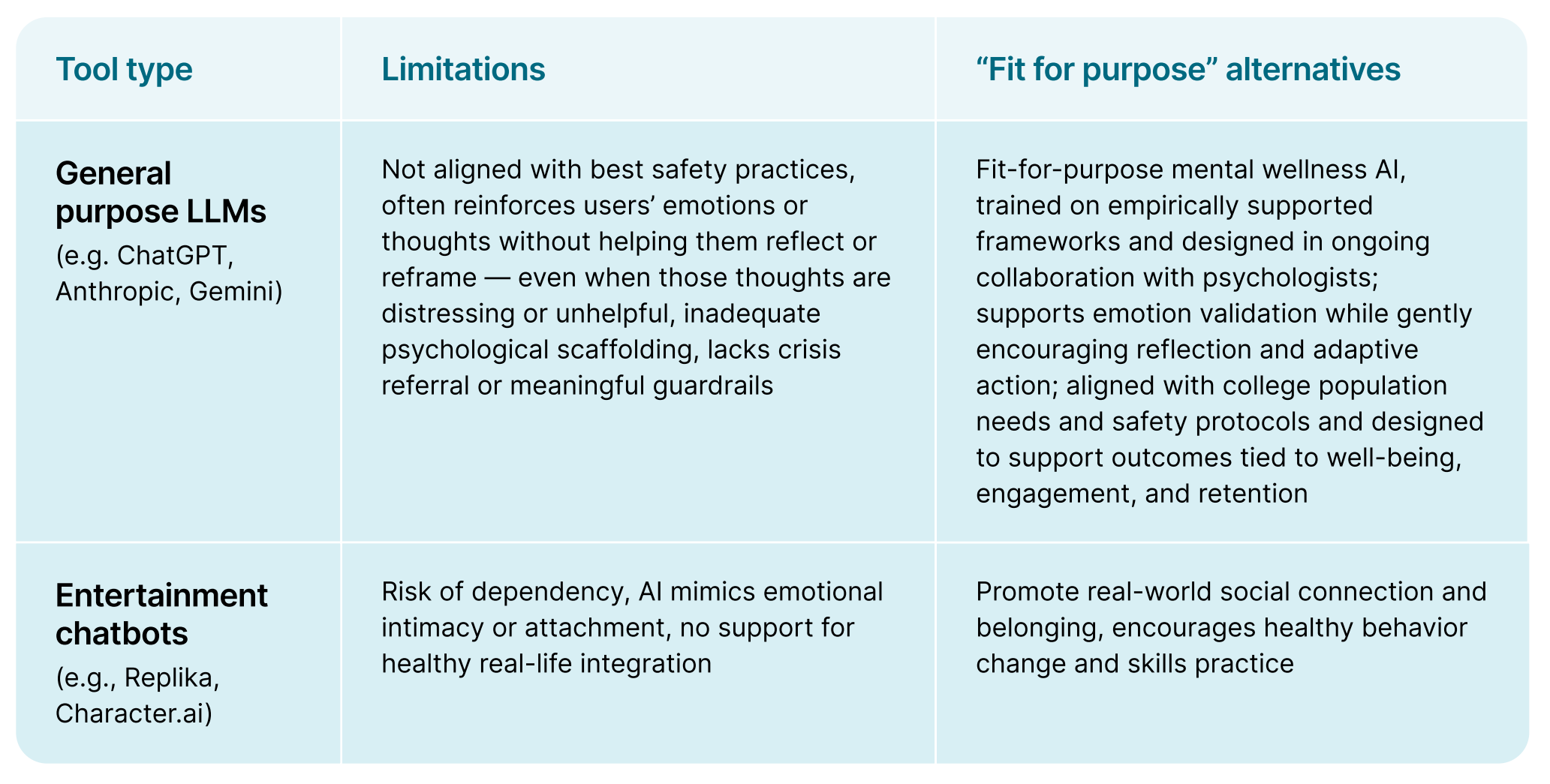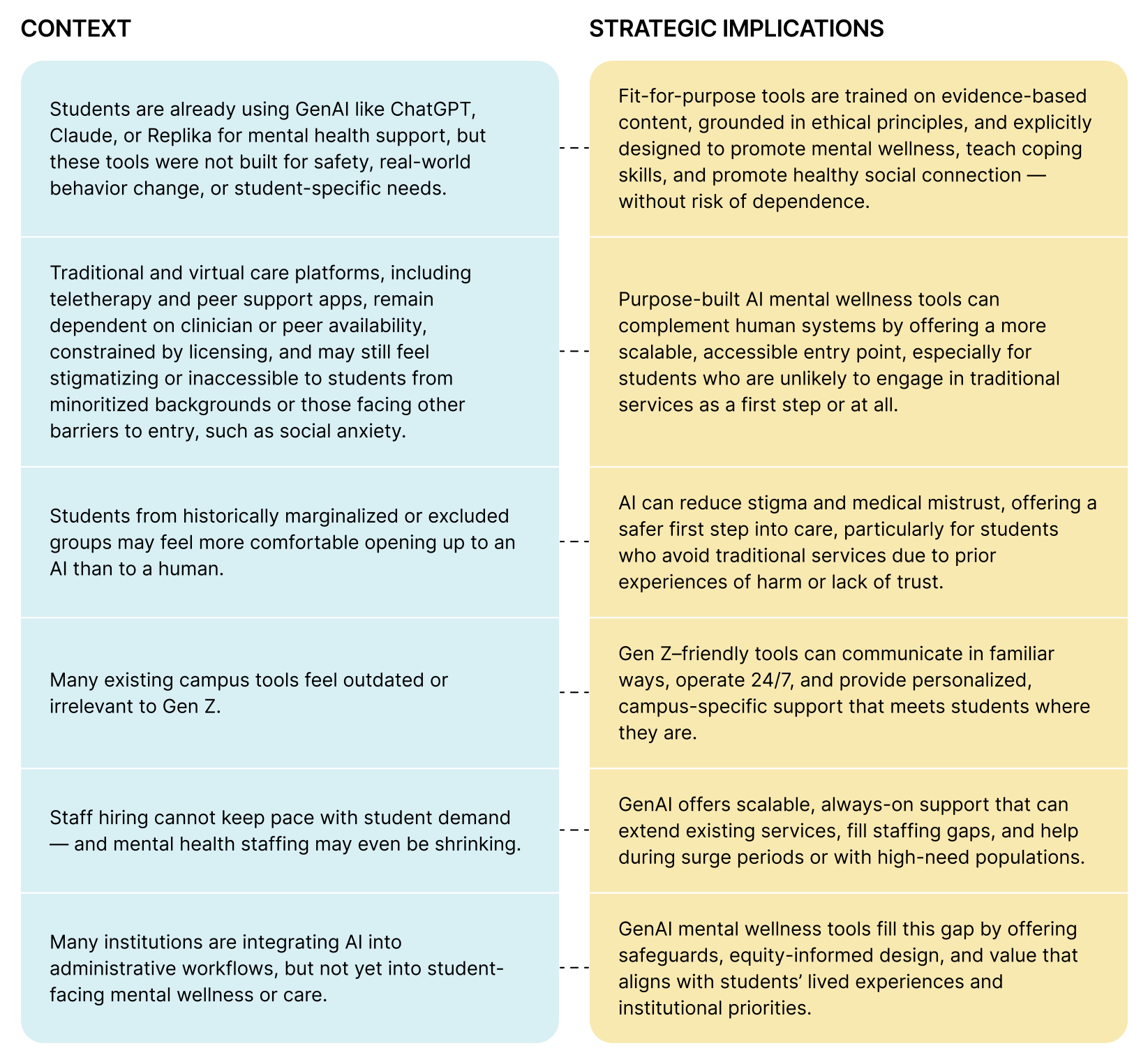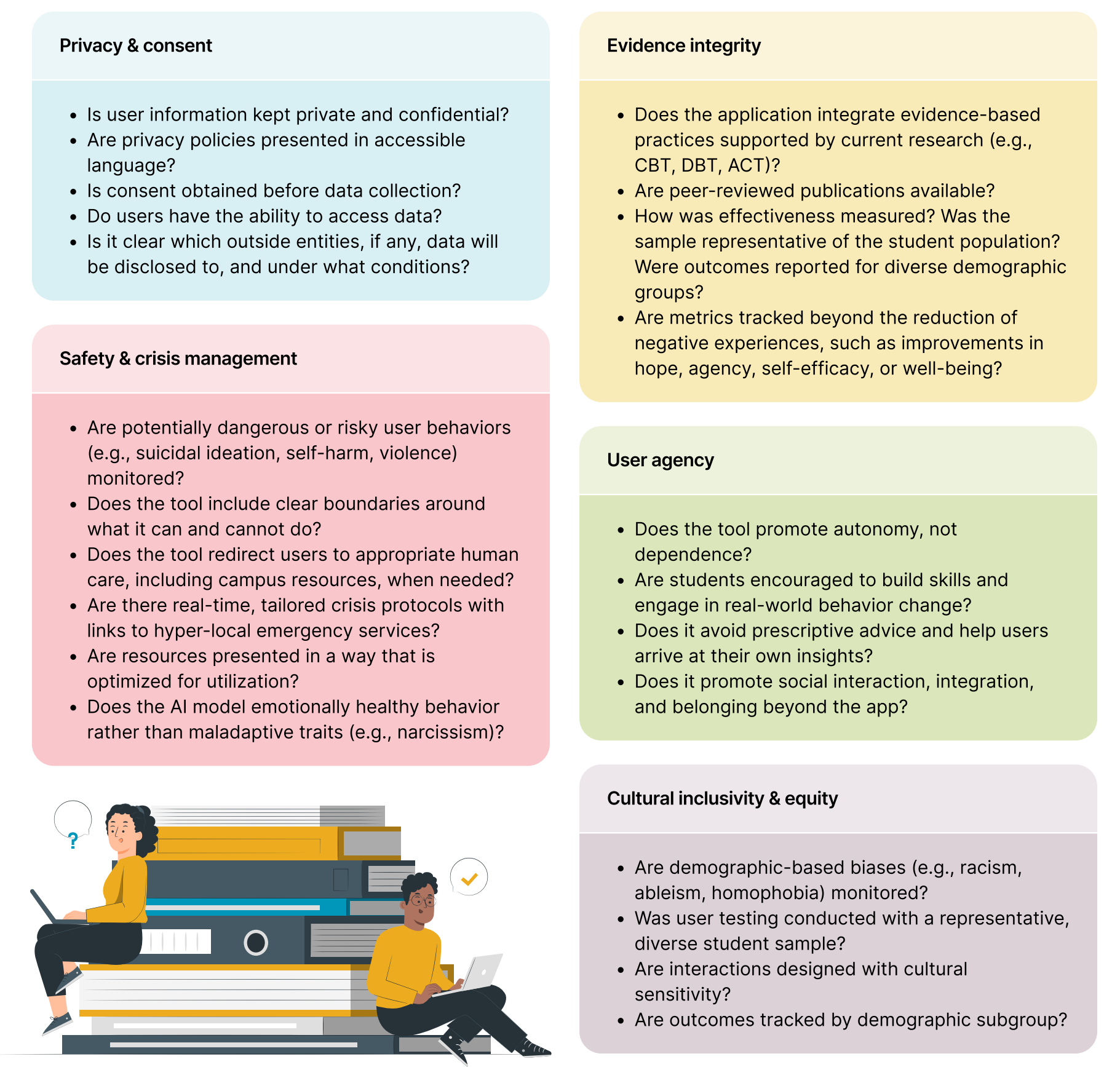Evaluating AI-Powered Mental Wellness Tools

Introduction
Student needs continue to rise amid a persistent campus mental health crisis, while traditional support systems face ongoing staffing shortages, budget constraints, and political scrutiny. In this environment, colleges and universities are exploring new ways to promote student well-being, including generative artificial intelligence (AI) tools designed to support mental wellness.
Generative AI (GenAI) refers to artificial intelligence systems like ChatGPT that generate human-like text in response to user input. In mental wellness contexts, these tools are being explored for their potential to simulate conversation, offer emotional support, and encourage self-reflection. As student needs rise and digital behaviors shift, many campuses are asking whether and how these tools might support broader mental health and wellness strategies. Yet not all tools are created equal, and those marketed as “fit-for-purpose” can still vary widely in quality, safety, and alignment with student needs.
Interest in GenAI tools is rising, with sessions at events like the American College Health Association 2025 Annual Meeting — including “Applications for AI in Student Health Today” and “Broadening Our Scope: Leveraging Generative AI for Enhanced Collegiate WellBeing” — spotlighting how students are already turning to general-purpose and entertainment platforms (e.g., ChatGPT, Replika) for emotional support, revealing a growing gap between student use and the campus tools and structures available to support it safely and meaningfully. This signals a major behavioral shift: students are already leveraging AI for mental wellness, whether or not institutions provide structured guidance.
Yet one core gap remains: how to evaluate these tools responsibly. In conversations with student affairs and counseling center leaders, one theme is clear: while interest is growing, most institutions lack a structured, values-aligned framework for assessing these technologies, even as expectations rise and they are asked to do more with less.
Campus leaders must navigate a fast-moving, fragmented marketplace while balancing the priorities of diverse stakeholders: students seeking accessible support, parents and faculty concerned about well-being and academic success, institutional leaders managing retention and risk, and counseling center staff who may be cautious but curious. Even as new GenAI tools emerge, many lack transparency around safety practices, blur the line between wellness and clinical care, or fail to demonstrate meaningful outcomes.
Without a structured approach to evaluation, institutions risk adopting tools that seem innovative but fall short on inclusivity, effectiveness, or student safety. This guide is designed to close that gap. To our knowledge, it is the first practical framework created specifically to help higher education leaders evaluate GenAI tools for student mental wellness. It outlines research-informed criteria to support safe, ethical, student-centered decision-making so that campuses can act with clarity, care, and confidence.
How AI tools differ
Not all AI-powered tools serve the same purpose. Differences in design, safeguards, and scope can influence not only student mental wellness, but also help-seeking behavior, campus engagement, and institutional outcomes.

Not all “fit-for-purpose” tools meet the mark
As AI mental wellness solutions gain traction, some tools are now marketed as “fit-for-purpose” — yet still fall short of standards that define safe, effective, and developmentally appropriate support.
Common limitations include:
- Use of off-the-shelf LLMs with minimal evidence-informed guardrails
- Lack of grounding in empirically-supported methods
- Absence of clinical effectiveness data or outcome measures
- Weak or missing psychological scaffolding to support emotional and cognitive growth
- Prescriptive advice-giving that bypasses self-reflection and reinforces passivity
- Surface-level personalization that fails to align with individual user goals
- Over validation or sycophancy: uncritical agreement that may reinforce unhelpful beliefs and undermine growth
- Lack of inclusive design practices or representative user testing
- No integration of robust crisis protocols or connection to real-world resources that promote social engagement and safety
- Absence of clear, ongoing processes for iterative improvement based on real-world use
By contrast, truly fit-for-purpose tools are co-developed with psychologists and grounded in research-backed methods. They demonstrate measurable effectiveness, often through peer-reviewed publications or real-world usage data. These tools guide users to reflect and develop their own insights — rather than dispensing one-size-fits-all advice — and gently challenge unhelpful thoughts in ways that support positive cognitive and emotional shifts. Instead of fostering dependence, they promote real-world skill-building and behavior change.
High-integrity tools are also inclusive by design, reflecting diverse user identities and lived experiences. They use conversational memory and contextual awareness to personalize support, integrate robust real-time crisis protocols, and connect users to appropriate local resources that promote real-world engagement. Finally, they demonstrate a clear commitment to improvement — including continuous user testing, feedback loops, and alignment with the latest psychological science.
Why “fit-for-purpose” AI tools matter
Not all mental wellness tools — whether powered by GenAI, delivered by humans, or something in between — are built with student needs in mind. Understanding the context in which a tool was designed is key to evaluating its value, limitations, and role on campus. The table below outlines how context of design directly impacts a tool’s strategic role on campus.

Evidence integrity, safety, and cultural inclusivity
These questions can help institutions identify tools that are not only effective, but also safe, inclusive, and designed to foster autonomy, self-efficacy, and core life skills during the college years.

Conclusion
With rising student demand, shrinking resources, and increasing scrutiny, higher education leaders are seeking scalable, ethical solutions to support student mental wellness. Students are already turning to AI — often before institutions are ready — making thoughtful tool selection more urgent than ever.
But not all AI mental wellness tools are created equal. Some fall short on safety, inclusivity, or measurable outcomes, even when marketed as “fit-for-purpose.” Without clear criteria, institutions risk adopting tools that do not align with their mission or meet the needs of today’s students.
When intentionally chosen, GenAI tools can expand access, promote real-world behavior change, and strengthen student engagement, belonging, and retention. This guide is designed to help institutions evaluate those tools with rigor, transparency, and student well-being at the center — not just to adopt new technologies, but to do so responsibly.
References
Abelson, S., Eisenberg, D., & Johnston, A. (2024). Digital mental health interventions at colleges and universities: understanding the need, assessing the evidence, and identifying steps forward. The Hope Center, Temple University. May 2024.
Golden, A., & Aboujaoude, E. (2024). Describing the Framework for AI Tool Assessment in Mental Health and Applying It to a Generative AI Obsessive-Compulsive Disorder Platform: Tutorial. JMIR Formative Research, 8(1), e62963.
Reyes-Portillo, J.A., So, A., McAlister, K., Nicodemus, C., Golden, A., Jacobson, C., & Hubert, J. (In press.) Generative artificial intelligence powered mental wellness chatbot for college student mental wellness: An open trial. JMIR Formative Research.
Rousmaniere, T., Li, X., Zhang, Y., & Shah, S. (2025, March). Large language models as mental health resources: Patterns of use in the united states.
Scholich, T., Barr, M. M., Stirman, S. W., & Raj, S. (2024). Can Chatbots Offer What Therapists Do? A mixed methods comparison between responses from therapists and LLM-based chatbots.
Stade, E. C., Eichstaedt, J. C., Kim, J. P., & Stirman, S. W. (2025). Readiness Evaluation for AI-Mental Health Deployment and Implementation (READI): A review and proposed framework.
Request a demo to learn how Wayhaven can support your campus
Get in touch with our team today
.svg)

